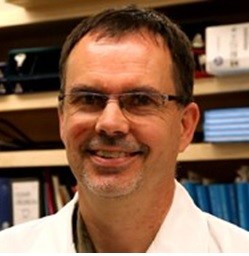
Published on July 19, 2022 |
Harold Aukema, Ph.D., University of Manitoba (Co-Funded by PKD Foundation of Canada)
How did you first get involved in PKD research?
Harold Aukema: When I was a graduate student, our lab acquired one of the first models of PKD and I was excited about the potential of diet to have an impact on disease progression. So, when given the opportunity to work on a diet and PKD study in these mice, I jumped at it and I’ve been working in PKD research off and on ever since.

What are you working on currently?
Harold Aukema: I’m currently working on a project that was recently funded by the PKD Foundation and the PKD Foundation of Canada on the effect of whole foods compared to processed foods, and plant-based compared to animal-based foods on progression of kidney disease in models of PKD. Interestingly, one of the models we are using is the same one I started my research on.
What would you like the patient community to know about your research?
Harold Aukema: I’m grateful for the opportunity given by the PKD Foundations to study this topic and believe that our results will provide pre-clinical data (it will still need to be tested in people) of whether individuals with PKD should consume more whole foods or more plant-based foods. There is much interest in this, but direct proof in PKD is still missing.
Do you have a personal connection to PKD?
Harold Aukema: No, it started as an interesting research question and the interest has stayed with me ever since.
What excites you most about this research?
Harold Aukema: I believe that no matter the results, it will help guide future dietary recommendations for PKD.
What are some of your personal interests outside of research?
Harold Aukema: Reading, hiking, traveling, cycling.
Did you enjoy Dr. Aukema’s story? Want to learn more about others funded by the PKDF? To learn more, find bios for all our funded researchers here! And check out other recent researcher spotlights.









I am pkd patient from Pakistan some help me
Can a Nicaraguan citizen, with tourist visa rights, be treated in Canada